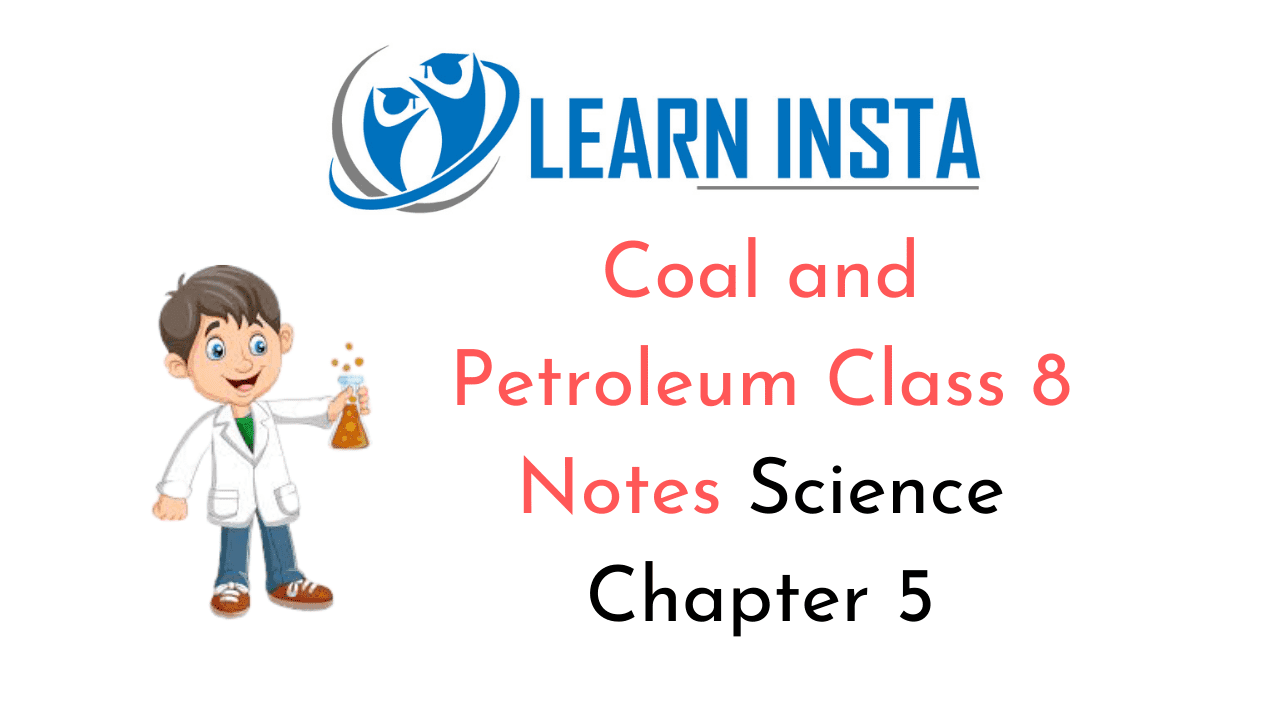
On this page, you will find Coal and Petroleum Class 8 Notes Science Chapter 5 Pdf free download. CBSE NCERT Class 8 Science Notes Chapter 5 Coal and Petroleum will seemingly help them to revise the important concepts in less time.
CBSE Class 8 Science Notes Chapter 5 Coal and Petroleum
Coal and Petroleum Class 8 Notes Understanding the Lesson
1. All the things that are required to fulfil our needs are called resources.
2. Some resources like air, water, fuels, plants occur in nature. They are called natural resources.
3. Some resources like plastics, machines, etc., are man-made.
4. Natural resources are classified as:
- Inexhaustible natural resources and
- Exhaustible natural resources.
5. Inexhaustible natural resources are present in unlimited quantity in nature; e.g., sunlight, air, etc. Exhaustible natural resources are present in limited quantity in nature; e.g., petroleum, natural gas, wildlife, forest, etc.
6. Some of exhaustible resources are renewable while some are non-renewable.
7. Natural fuels that are made up by the dead remains of living organisms for over a long period of time, are called fossil fuels.
8. Fossil fuels may be divided into three categories:
- Solid – Coal
- Liquid – Petroleum
- Gas – Natural gas
9. Coal is black-coloured hard substance that mainly contains carbon.
10. Coal is one of the main sources of energy worldwide.
11. Coal is one of the fuels used to cook food, run engines, generate electricity and to run various industries. Millions of years ago, trees, plants, ferns and forests got buried below the rocks, soil and sand.
12. Under anaerobic condition high temperature and pressure, the carbon enriched organic matter of plants slowly got converted into coal.
13. This slow process of conversion of wood into coal is called carbonisation.
14. Destructive distillation of coal is done at 1000°C in absence of air to obtain many other useful organic and inorganic substances from it, such as coke, coal tar and coal gas.
15. Coke is a tough, porous and black substance. It is an almost pure form of carbon.
16. Coke is used in the manufacture of steel and in the extraction of many metals.
17. Coal tar is a black, thick liquid with an unpleasant smell. It is a mixture of about 200 substances.
18. Products obtained from coal tar are used as starting materials for manufacturing various substances used in everyday life and industry like dyes, drugs, naphthalene balls, paints, plastics, etc.
19. Coal gas is produced during the processing of coal to get coke.
20. It is used as a fuel in many industries situated near the coal processing units.
21. The word ‘petroleum’ is derived from petra meaning ‘rock’ and oleum meaning ‘oil’.
22. Petroleum is a dark coloured viscous fluid and like all the other oils, it is lighter than water.
23. Petroleum was formed when organisms living in the sea are buried underneath sedimentary rock and subjected to intense heat and pressure under anaerobic condition.
24. Petroleum has such a great significance that it is named as ‘black gold’.
25. Separation of different constituents of petroleum through fractional distillation is called refining of petroleum.
26. Refining of petroleum is carried out in a petroleum refinery.
27. Natural gas is a very important fossil fuel because it is easy to transport through pipes.
28. Natural gas is stored under high pressure as compressed natural gas (CNG).
29. The great .advantage of CNG is that it can be used directly for burning in homes and factories.
30. We must use the fuels only when it is absolutely necessary.
31. In India, the Petroleum Conservation Research Association (PCRA) advises people how to save petrol/ diesel while driving.
32. To conclude, we can say that fossil fuels are our very important resources of energy. But as they are limited, we should use them judiciously.
Class 8 Science Chapter 5 Notes Important Terms
Coal: A fossil fuel, formed by the decay of vegetation which existed millions of years ago is called coal.
Coal gas: A mixture of gases produced during destructive distillation of coal is called coal gas.
Coal tar: Coal tar is a black coloured thick, viscous liquid which is obtained as byproduct when coal is carbonised to make coke.
Coke: On heating the coal strongly, the volatile impurities escape out from it and solid, pure carbon residue is left behind which is called coke.
Fossil fuel: Natural fuel that made up by burial of living organisms under deep down the earth for over a long period of time is called fossil fuel.
Natural gas: The gaseous mixture of lower hydrocarbon which occur deep inside the earth either alone or covering the crude oil in an oil field is called natural gas.
Petroleum: A dark coloured thick crude oil found deep below the ground is called petroleum.
Petroleum refinery: A place where process of separating the various constituents of petroleum is car-ried out is called petroleum refinery.